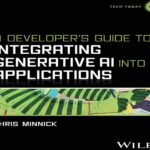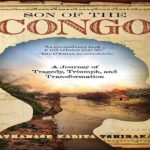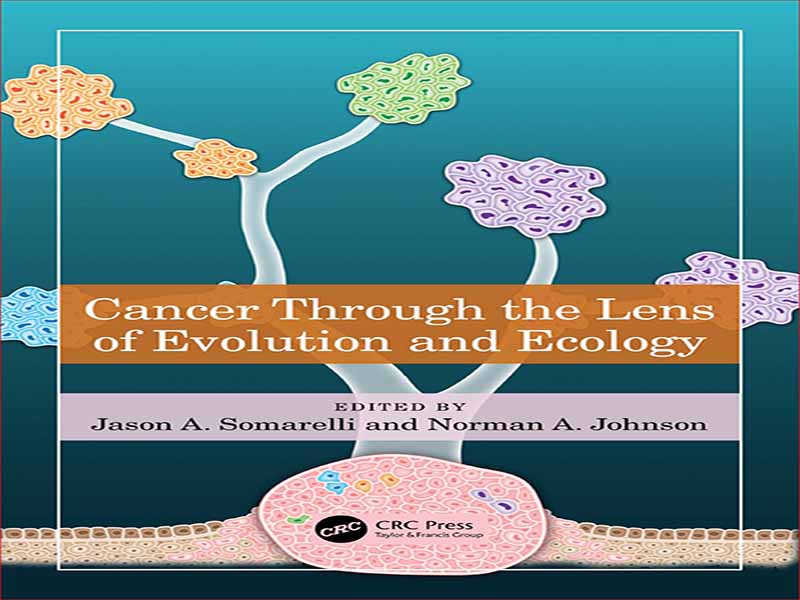- عنوان کتاب: Cancer through the Lens of Evolution and Ecology
- نویسنده: Jason A. Somarelli
- حوزه: سرطان
- سال انتشار: 2024
- تعداد صفحه: 214
- زبان اصلی: انگلیسی
- نوع فایل: pdf
- حجم فایل: 7.54 مگابایت
بوم شناسان و زیست شناسان تکاملی معمولا در بخش های متفاوتی نسبت به محققان سرطان مستقر هستند. گاهی اوقات آنها حتی در کالج های مختلف در یک دانشگاه هستند. آنها به منابع مالی مختلف متکی هستند. آموزش های متفاوتی دارند. آنها به جلسات مختلف می روند. آنها مجلات مختلف را مطالعه می کنند. آنها چارچوب های مرجع متفاوتی دارند که هر کدام اصطلاحات مخصوص به خود را دارند. و با این حال، علیرغم تقسیم بندی محققان در این زمینه های مطالعاتی، پیشرفت سرطان اساساً یک فرآیند تکاملی است که در سالن های اکولوژیکی اتفاق می افتد. با هر تقسیم، سلولهای تومور اطلاعات ژنتیکی خود را به فرزندان خود منتقل میکنند – این وراثت کامل نیست و اجازه میدهد تا تفاوتهای ژنتیکی انباشته شوند. سلول های سرطانی در توانایی خود برای تکثیر، به دست آوردن و استفاده از منابع، و زنده ماندن از توهین های مختلف در محیط خود متفاوت هستند. همانطور که داروین به ما آموخت، وراثت، تنوع، و بقا و بازتولید متفاوت، اصول اساسی تکامل توسط انتخاب طبیعی هستند. بوم شناسی نیز ضروری است: توانایی ژنوتیپ های مختلف سلول برای بقا و تکثیر در ریزمحیط های مختلف متفاوت است. علاوه بر این، سلولهای تومور مانند بیشسوارها (یا درختان بلوط) محیط خود را شکل میدهند، سلولهای تومور نیز از طریق ارتباط – به صورت محلی و دیستال – با سلولهای سرطانی و سلولهای غیرسرطانی انجام میدهند. و بوم شناسی بدن نیز با توجه به اینکه سلول های تومور تا چه حد می توانند از درمان های درمانی جان سالم به در ببرند و پراکنده شوند (متاستاز) اهمیت دارد. تخصصی شدن روزافزون دانشگاه پیامد طبیعی رشد رشته هاست: هیچ کس این ظرفیت را ندارد که در همه چیز یا حتی همه چیز در زیست شناسی یا حتی زیرشاخه های زیست شناسی متخصص باشد. و با این حال، این تخصص فزاینده ارتباط بین دانشمندانی را که موضوعات بین رشتهای را مطالعه میکنند، مانند اکولوژی و تکامل سرطان، مختل میکند. در دو دهه اول این قرن، ارتباطات بیشتری بین زیست شناسان تکاملی و زیست شناسان سرطان مشاهده شد. تعامل بین این دو گروه هنوز به پتانسیل کامل خود نرسیده است، اما نشانه های واضحی از پیشرفت در چندین حوزه وجود دارد، مانند ایجاد یک کارگروه تکامل سرطان توسط انجمن آمریکایی تحقیقات سرطان. ارتباط بین بومشناسان و زیستشناسان سرطان عموماً از ارتباط رو به رشد بین زیستشناسان تکاملی و محققان سرطان عقب مانده است، اما برخی از شاخههای سبز در حال جوانه زدن هستند. این کتاب میوه دانههایی است که در نشست ماهوارهای در سال 2019 در مورد سرطان و تکامل که توسط انجمن زیستشناسی مولکولی و تکامل حمایت میشود و توسط جف تاونسند و جیسون آ. سومارلی سازماندهی شد، کاشته شد. در این جلسه بود که با سومارلی، زیست شناس مولکولی و محقق سرطان، و جانسون، ژنتیک دان تکاملی و نویسنده علم آشنا شدیم. در اینجا، هدف ما کاشت بذر گفتگو و همکاری بیشتر و ارائه مثالهای هیجانانگیز و قابل تامل است که در آن زمینههای اکولوژی، زیستشناسی تکاملی و تحقیقات سرطان میتوانند گرد هم آیند. ما با کمی نقشه راه شروع می کنیم، ابتدا با یک مرور کلی از تلاقی این سه زمینه، سپس با درک تأثیر درمان بر تکامل سرطان و اکولوژی و زیربنای ژنتیکی تکامل تومور. در مرحله بعد، ما یک سری فصل در مورد تکامل مولکولی سرطان، از جمله ارتباط بین سرطان و چند سلولی، شکل پذیری فنوتیپی در سرطان، و ژنتیک سرطان ارائه می کنیم. سپس، ما به اکولوژی انتقال میدهیم، که بحث متقابل سرطان-سیستم ایمنی را پوشش میدهد، و پتانسیل ژنتیک منظر، جغرافیای زیستی جزیره، و اکولوژی گونههای مهاجم را برای اطلاعرسانی به تحقیقات سرطان و بالعکس. بخش آخر رابطه سرطان با زندگی چند سلولی را از طریق سرطان شناسی مقایسه ای و بحث در مورد راه هایی که در آن سرطان شناسی مقایسه ای می تواند برای سرعت بخشیدن به ترجمه استراتژی های درمانی جدید برای سرطان مورد استفاده قرار گیرد را پوشش می دهد. در نهایت، ما تلاش میکنیم تا ترکیب کنیم که چگونه مشاهده سرطان از طریق یک لنز اکولوژیکی و تکاملی ممکن است برای محققان سرطان، بومشناسان و زیستشناسان تکاملی مفید باشد. ما امیدواریم که این کتاب دیگران را تشویق کند تا در رشتههای مختلف برای راهحلهای جدید به نفع زندگی بیماران و خانوادههایشان مشارکت کنند.
Ecologists and evolutionary biologists are usually housed in different departments than cancer researchers. Sometimes they are even in different colleges within a university. They rely on different sources of funding. They have different training. They go to different meetings. They read different journals. They have different frames of reference, with each having their own jargon. And yet despite the partitioning of researchers in these fields of study, cancer progression is fundamentally an evolutionary process that takes place within ecological theaters. With each divi¬sion, tumor cells pass on their genetic information to descendants—this inheritance is not perfect, allowing genetic differences to accumulate. The cancer cells differ in their ability to replicate, to acquire and use resources, and to survive the various insults in their environments. Inheritance, variation, and differential survival and reproduction, as Darwin taught us, are the essential postu¬lates for evolution by natural selection. Ecology is also of essence: the ability of different genotypes of cells to survive and replicate will vary across different microenvironments. Moreover, much like beavers (or oak trees) shape their environment, so do tumor cells through communication—locally and distally—with both cancer cells and non-cancer cells. And the ecology of the body also matters with respect to how well tumor cells can survive therapeutic treatments and disperse (metastasize). The increasing specialization of academia is a natural consequence of the growth of disciplines: no one has the capacity to be an expert in everything or even everything within biology or even subfields within biology. And yet this increasing specialization impedes communication across sci¬entists studying interdisciplinary topics, such as the ecology and evolution of cancer. The first two decades of this century have seen more communication between evolutionary biol¬ogists and cancer biologists. The interplay between these two groups has not yet reached its full potential, but there are clear signs of progress across several realms, such as the establishment of a cancer evolution working group by the American Association for Cancer Research. Communication between ecologists and cancer biologists has generally lagged further behind the burgeoning connec¬tivity between evolutionary biologists and cancer researchers, but some green shoots are sprouting. This book is the fruit of seeds planted at a 2019 satellite meeting on cancer and evolution spon¬sored by the Society for Molecular Biology and Evolution and organized by Jeff Townsend and Jason A. Somarelli. It was at this meeting where we met: Somarelli, a molecular biologist and cancer researcher, and Johnson, an evolutionary geneticist and science writer. Herein, we aim to sow more seeds of conversation and collaboration and to provide exciting and thought-provoking examples where the fields of ecology, evolutionary biology, and cancer research can come together. We begin with a bit of a roadmap, first with an overview of the intersection of the three fields, followed by an understanding of the influence of therapy on cancer evolution and ecology and the genetic underpinnings of tumor evolution. Next, we provide a series of chapters on molecular evolu¬tion of cancer, including the connections between cancer and multicellularity, phenotypic plasticity in cancer, and cancer genetics. Then, we transition to ecology, covering cancer-immune system cross-talk, and the potential for landscape genetics, island biogeography, and invasive species ecol¬ogy to inform cancer research and vice versa. The last section covers the relationship of cancer to multicellular life through comparative oncology and a discussion of ways in which comparative oncology can be leveraged to speed translation of new therapeutic strategies for cancer. Finally, we attempt to synthesize how viewing cancer through an ecological and evolutionary lens may benefit cancer researchers, ecologists, and evolutionary biologists alike. We hope this book encourages oth¬ers to engage across disciplines for new solutions to benefit the lives of patients and their families.
این کتاب را میتوانید بصورت رایگان از لینک زیر دانلود نمایید.



































نظرات کاربران